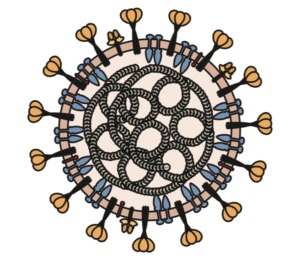

Although we are less than a year into the SARS-CoV-2 pandemic, it appears that the antibodies induced by infection are often of poor quality, and B cell memory seems limited. An explanation for this outcome might be a consequence of the loss of germinal centers in COVID-19 patients.
Examination of lymph nodes and spleen of patients who succumbed to COVID-19 revealed a striking absence of germinal centers. During a virus infection, foreign antigens brought into the secondary lymphoid organs are recognized by B cells, which then proliferate and differentiate. This activity takes place within germinal centers, which also provides an environment for the production of high affinity antibodies by the process of somatic hypermutation. The production of long-lived memory B cells also depends on the germinal center.
The absence of germinal centers in patients with severe COVID-19 may explain why these patients produce poor quality antibody that is not durable. However, these patients do produce antiviral antibodies, often at higher levels than in patients with mild disease. These antibodies are not produced in germinal centers, which explains why they do not provide optimal or durable immunity.
It seems likely that the cytokine storm produced during severe COVID-19 is at least partly responsible for the loss of germinal centers. Loss of germinal centers during cytokine storm in mice has been shown to be reversed by blockade of TNF-alpha. This cytokine is abundant in lymph nodes from SARS-CoV-2 infected patients, and was recently identified as a biomarker that may predict serious disease. Monoclonal antibodies to TNF-alpha are licensed for the treatment of other diseases such as rheumatoid arthritis, and could be assessed for the ability to improve outcomes in COVID-19.
An important question is why only some SARS-CoV-2 infected patients progress to serious COVID-19. Such patients might have defects in lymphocyte function yet to be determined. Furthermore, they might be unable to mount an effective early innate response to infection, and consequently virus reproduces to high levels, causing an over-exuberant immune response. This scenario is no doubt simplistic and will surely be modified by the results of further studies of immune responses in infected patients. Whether patients with less severe disease are able to produce germinal centers is unknown but should be determined.
Other viral infections, including those caused by influenza H5N1 virus, Ebolaviruses, SARS- and MERS-CoV are also characterized by cytokine storm and depletion of lymphoid cells. It is possible that similar underlying immune mechanisms govern the serious disease caused by these infections.
What are the implications of these findings for vaccines to prevent COVID-19? It is unlikely that vaccination with any of the candidates currently in development will lead to germinal center loss because most of these vaccines do not comprise infectious SARS-CoV-2. Consequently the vaccine antigens – mainly spike glycoprotein – need only induce durable protective immunity. A tall order, but one that can be achieved as long as germinal centers remain intact.
